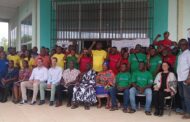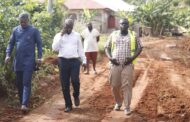In the lush fields of Abrewapong, a community nestled in Asante Akyem North, the tranquil rhythms of farming life have been disrupted by a contentious issue: the alleged sale of farmlands to a foreign company for bamboo cultivation.
This development has thrown the livelihoods of several farmers into uncertainty, sparking a fervent determination among the plantain farmers to defend their economic interests.
Voicing their concerns to the press, the farmers expressed adamant opposition to any attempt to jeopardize their livelihoods in favor of bamboo cultivation.
Their defiance stems from a deep-rooted attachment to their lands, which have sustained their families for generations through the cultivation of plantains.
Nana Kwadwo Otchere, the Saanahene of Abrewapong, underscored the unwavering stance of the community against the purported actions of the Eco Planet Bamboo Company.
He emphasized that the company’s activities pose a direct threat to the well-being of his people and their way of life, asserting that the company has no legitimate claim to their lands.
The situation has drawn the attention of local authorities, with the District Chief Executive (DCE) for Ashante-Akyem North, Francis Oti Boateng, acknowledging the gravity of the issue.
Upon learning of the alleged land sale and its implications, Boateng took decisive action by halting all activities by the bamboo company.
He emphasized the importance of upholding the rule of law and urged the community not to take matters into their own hands.
A visit to the affected area revealed the extent of the damage inflicted upon plantain crops, serving as a poignant reminder of the tangible impact of the dispute on the farmers’ livelihoods.
The sight of their withered fields only strengthened the resolve of the farmers to resist any encroachment on their lands.
The standoff between the farmers and the bamboo company underscores broader tensions surrounding land ownership and agricultural development in Ghana.
While bamboo cultivation holds promise for economic growth and environmental sustainability, it should not come at the expense of local communities’ rights and livelihoods.
As the controversy unfolds, it serves as a reminder of the importance of inclusive and transparent decision-making processes that prioritize the interests of all stakeholders.
In the face of adversity, the farmers of Abrewapong stand united in defense of their lands, signaling a powerful testament to the resilience and determination of rural communities in Ghana.
Source:Mybrytfmonline.com




















































